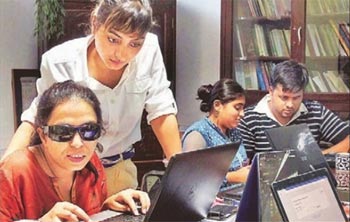Talking libraries, where visually impaired individuals can listen to books instead of using Braille, will soon go digital, so that students can access recorded material from the internet and mobile phones.

Deepika (extreme left) trains others on the digital access information system in Chandigarh. HT-Photo
The Amrik Singh Cheema Foundation Trust, which introduced the concept of talking libraries for the visually impaired students in the city free of cost, is now working towards turning it into the city’s first digital talking library.
“The digitalised library will be beneficial to the visually impaired and also to the old and ailing, who cannot hold a book. We have adopted a new technique through which more books can be recorded in a lesser time,“ said Bani Cheema, executive director of the foundation. The foundation has adopted the Digital Access Information System (DAISY), where the digital audio books can be created in half the time; and the navigation system is unique that allows the user to find a particular chapter, paragraph or a line. The system breaks the entire chapter into sections, making it easier for students to find their particular requirement.
“With the higher education exams approaching, we have a huge responsibility of recording the students’ syllabi, therefore we are using this system to make things easier,“ said Bani.
DAISY Forum of India has TALKING BOOKS TO BE AVAILABLE IN FORMATS ACCESSIBLE ON THE INTERNET AND MOBILE PHONES their own online catalogue that helps even international students access the books online. The foundation will also cater to international students once it starts uploading the books.
Deepika from Saksham, Delhi, who is visually impaired, is currently in the city to provide training about the system.
“JAWS (Job Access with Speech) enables the visually impaired to access books. The software reads out what is written on the screen. Through DAISY, students will get access to digitalised books that can be heard through JAWS. Therefore, students can now study without cassettes and CDs and can opt for mobile phones or computers,“ said Bani, adding that she needed more volunteers to record the books, so that the entire syllabi could be provided to the visually impaired students at the earliest.
